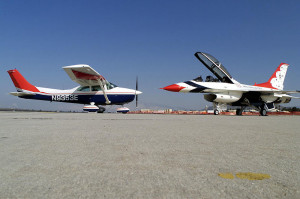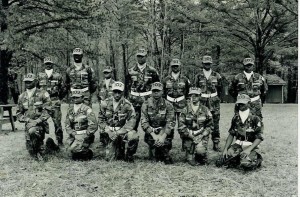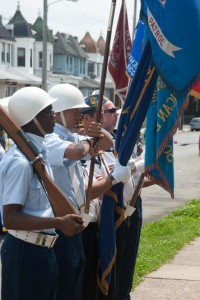Philadelphia Composite Squadron 103 is part of the National organization called Civil Air Patrol (CAP) which a civilian auxiliary of the United States Air Force. Like our parent organization, Squadron 103 has three primary missions: areospace education, emergency services, and the cadet program.
Aerospace Education
Our aerospace education efforts focus on two different audiences: volunteer CAP members and the general public. The programs ensure that all CAP members (seniors and cadets) have an appreciation for and knowledge of aerospace issues. To advance within the organization, members are required to participate in the educational program. Aerospace educators at CAP’s National Headquarters at Maxwell Air Force Base, Ala., provide current materials that reflect the highest standards of educational excellence. Aerospace education is divided into two parts: internal and external.
- The internal aerospace education program is a requirement for cadet progression through the achievement levels of the cadet program. Senior members have a responsibility to become knowledgeable of aerospace issues and the AE program that CAP provides. They are further encouraged to share the information obtained with their local communities and school systems. Orientation flights and flight scholarships are also offered to cadets through our aerospace program.
- The external aerospace programs are conducted through our nation’s educational system. Each year, CAP sponsors many workshops in states across the nation, reaching hundreds of educators and thereby thousands of young people. These workshops highlight basic aerospace knowledge and focus on advances in aerospace technology. CAP’s aerospace education members receive more than 20 free aerospace education classroom materials.
Emergency Services
Since World War II our award winning squadron Ranger Team know as the “Wolfpack” has been focused on saving lives and alleviating human suffering through a myriad of emergency-services and operational missions.
- Search and Rescue – Perhaps best known for our search-and-rescue efforts, we support several missions a year to find missing persons and downed aircraft
- Disaster Relief – Another important service we perform is disaster-relief operations. We support CAP in providing air and ground transportation and an extensive communications network. Volunteer members fly disaster-relief officials to remote locations and provide manpower and leadership to local, state and national disaster-relief organizations. CAP has formal agreements with many government and humanitarian relief agencies including the American Red Cross, Federal Emergency Management Agency, Federal Aviation Administration, National Transportation Safety Board and the U.S. Coast Guard
- Humanitarian Services - usually in support of the Red Cross-transporting time-sensitive medical materials including blood and human tissue, in situations where other means of transportation are not available
- Counterdrug - we joined the “war on drugs” in 1986 when, pursuant to congressional authorization, CAP signed an agreement with the U.S. Air Force and U.S. Customs Service offering CAP resources to help stem the flow of drugs into and within the United States
Cadet Programs
While there are many youth oriented programs in America today, our cadet program is unique in that it uses aviation and emergency services as a cornerstone. Thousands of young people from 12 years through age 21 are introduced to aviation and emergency services through CAP’s cadet program. The program allows young people to progress at their own pace through a 16-step program including aerospace education, leadership training, physical fitness and moral leadership. Cadets compete for academic scholarships to further their studies in fields such as engineering, science, aircraft mechanics, aerospace medicine, meteorology, as well as many others. Those cadets who earn cadet officer status may enter the Air Force as an E3 (airman first class) rather than an E1 (airman basic).
As part of our emergency services we train our members in search and rescue as well as woodsmanship and survival. Whatever your interests-survival training, flight training, astronomy-there’s a place for you in our cadet program. Each year, our cadets have the opportunity to participate in special activities at the local, state, regional or national level. Many cadets will have the opportunity to solo fly an airplane for the first time through a flight encampment or academy. Others will enjoy traveling abroad through the International Air Cadet Exchange Program. Still others assist at major air shows throughout the nation.






